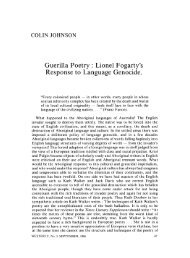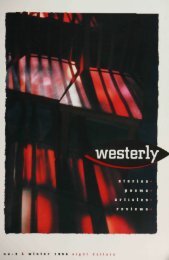other respects his attitude was more conservative.His novels are set in the period ofhis grandparents' youth; and as Professor Orelpoints out, when he remarks that his youngerreaders may not remember how important toeveryone a good harvest was before the repealof the Corn Laws, we are apt to forget thatthey were repealed when Hardy himself wasa small boy. Hardy confessed to going to greatlengths to check trivial details in his attemptto recreate a past age in the countryside, eventhough he knew it was impossible that anyoneshould detect a mistake. More than the dispassionatecuriosity of an historian. Hardyseems motivated by a desire to honour thememory of a dead group of countrymen, allknown well by him and amongst them someof his immediate forebears. He wished to makesome record of the manner of their lives whichwould otherwise be forgotten. He shows ushow changes have altered village life; for example,when the village quire, which consistedof instrumentalists as well as singers, all "officiallyoccupied with the Sunday routine", isreplaced by one organist, local interest in thechurch declines sharply.Hardy writes of the loss of village customsand traditions in 'The Dorsetshire Labourer'.These losses were a result of the annual removalwhich had become habitual amongstfarm workers. His description of the hiring fairshows Hardy's compassion for the older workersin their insecurity. For younger workersemployment came easily and the annual removalwas something to look forward to.Hardy's description of it is lively and amusing.Since he was never long in one localitythe labourer, according to Hardy, had "a lessintimate and kindly relation with the soil hetilled". Even so. Hardy admitted that theseworkers were freer and more knowledgeablethan the old labourers who had "lived and diedon a particular plot, like a tree', and he agreedthat workers should not remain stagnant toplease romantic spectators.Amongst these essays are several records ofHardy's friendships. Friendships for examplewith George Meredith, Henry Moule, and thepoet William Barnes. This last is perhaps ofgreatest interest since the two writers hadmuch in common. Barnes, too, was trying torecord a dying way of life in a particularlocality, though his locality was narrower thanHardy's, and his poetry was written in a dialectwhich yearly fewer people spoke. Barnes,Hardy wrote, had realised "that human emotionis the primary stuff of poetry" and thecountrymen about whom he wrote, Hardysaid, had a poetic quality in their lives "lessin the peasant's residence among fields andtrees, than in his absolute dependence on themoods of the air, earth and sky". This statementseems to me significant in relation toHardy's own work. The "absolute dependence"perhaps accounts for the strange passivitywhich often marks Hardy's characters.Students of Hardy and indeed students ofthe nineteenth century will be grateful to ProfessorOrel for this useful book. ProfessorOrel's notes are scholarly and informativerather than critical, and in a work of thiskind this is no disadvantage, as the readerwill wish to concentrate upon the text. Thebook is interesting not only for the expressionit gives to Hardy's ideas, but for the impressionof Hardy's personahty which emerges from it.60 WESTERLY, No. 1, AAARCH, 1968
D. E. HutchisonTHE EARTH AROUND USBetween Wodjil and Tor, Barbara York Main,The Jacaranda and Landfall Presses, Brisbaneand Perth, 1967, $4.80.It is a pity that Paul Rigby, whose satire isoften sharply accurate, should have saddledconservationists in this State with the imageof a fuddy-duddy in ancient frock-coat andbattered top hat wielding the banner, " 'andsoff our 'eritage'". Fortunately, however, thelocal press has given sober and considerablesupport to the demand for a sensible conservationpolicy. Dr Main's book should do muchto dispel the former image and will contributesubstantially to the latter campaign. It is easyfor Western Australians to feel that this is notan urgent matter. Indeed it is not yet quite aspressing as in other places. A speaker on theA.B.C. programme "Insight" recently statedthat by the year 2000 the United States willbe 50 million acres short of recreational area—an estimate which was unrealistic because itincluded practically unusable waste-lands. Wemay feel that we are a long way from thisimpasse yet, but if account is taken of themuch larger areas of Australia which are aridand may never be of use either as pastoral orrecreational areas, perhaps the matter is becomingmore urgent.Dr Main's book is probably unique in theliterature of Australian natural history andbelongs to a class of literature which includesthe splendid books by Rachel Carson about thesea. In some ways it is unfair to use RachelCarson's books for comparison, for she had,in addition to scientific information, a richstore of maritime myth and legend to drawupon. It can be said at once that for thisreason, and partly because Dr Main's literarygifts are not of as high an order. BetweenWodjil and Tor may not appeal to so many.I hope, however, that its many merits willcause it to be read widely.WESTERLY, No. 1, MARCH, 1 968The book also marks the establishment ofa new publisher. Landfall Press, in Perth. Thisfirst venture it shares with Jacaranda Press ofBrisbane, which in recent years has had one ofthe most imaginative publishing policies of anyAustralian press. Considered physically, as apiece of book production, this is a handsomevolume, with a striking jacket on which is alarge coloured photograph of the sandplainpear, one of our attractive species which isthreatened by the spread of agriculture. Theprice is reasonable, considering the wealth ofillustration. The wide margins include, on almostevery page, Dr Main's own sketches.Even the most amateurish of these sketchesconveys the appearance of the trees and thelandscape remarkably faithfully. Taken as awhole they add great charm to the book, makingit a very personal record of a scientificand aesthetic appreciation of the ecology ofthe countryside most familiar to Western Australians.Dr Main has admitted to a 'personalexaltation', but realistically pleads not for totalpreservation, but for a conservation policywhich will allow the wilderness and settledlands to exist in harmony.She has given us a detailed survey of a smallarea of bushland through a full cycle of theseasons. I do not think that any Australianwriter, certainly not a scientist, has attemptedto do this before. We need more of theseregional studies. I hope that there are otherscientists who can write so affectionately aboutother types of Australian bushland, with acomparable intimacy of knowledge. The 'wodjil'of the title is a native word for the acaciadominatedthickets of the wheatbelt and 'tor'refers to one of the fascinating granite 'islands'.I have not, hitherto, heard them referred toas 'tors'.It is fortunate that those massive 'islands'of granite are scattered fairly liberally in ourwheatbelt. They have been barriers to total61
- Page 1 and 2:
westerlyA QUARTERLY REVIEW PRICE 60
- Page 3:
westerlya quarterlyreviewEDITORIALC
- Page 6 and 7:
Some JOURNALS published byUNIVERSIT
- Page 8 and 9:
"WeU, maybe this one is, too.""With
- Page 10:
a leer. What really infuriated her
- Page 13 and 14: Guest of honour? No less than the G
- Page 15 and 16: THE NAVIGATORS(To Albert Tucker)Bei
- Page 17 and 18: Mother of navigators.Beater of men.
- Page 19 and 20: Horizon-haunted men.Looters and Pir
- Page 21 and 22: On the table Taki had left a crumpl
- Page 23 and 24: FEARA thousand, thousand stars and
- Page 25 and 26: Judith ClarkeTHANK YOU MRS. GREENBE
- Page 27 and 28: Oh no, thought Lai Chandra, oh no.
- Page 29: "Nuance," she said- and "poetry,"an
- Page 32 and 33: TO WAKE, TO FLOWfor my wifeFor me t
- Page 34: With apparent indulgence Lola encou
- Page 39 and 40: or another, and some of the paintin
- Page 41: I do not think it has been fulfille
- Page 45 and 46: important thing for a writer who ha
- Page 47 and 48: from which she herself had sprung.
- Page 49 and 50: They are looking for him now in the
- Page 51 and 52: departure from what had come to be
- Page 53: ary degree the atmosphere of a trib
- Page 56 and 57: Blessed is the mother with her chil
- Page 58 and 59: IF YOU DON'T KNOW HOWDON'T DO ITft>
- Page 60 and 61: And yet perhaps both men drew from
- Page 64 and 65: clearing and, as they are usually t
- Page 66 and 67: WHAT IS THECRITIC?The Critic is a c
- Page 68: JOHN KEATSBronze cast from a life m







